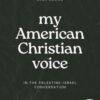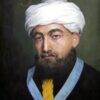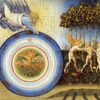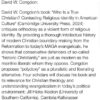Tag: “Christian
My American Christian Voice
How can we use our voices for justice in Palestine and Israel as American Christians? ELCA Blogs
Maimonides on Divine Simplicity: With Christian Relief
More from the philosophy class. As I reread this just now I didn’t really answer the whole question. Although, I amended it since in the class forum. What does it mean to say that the concept of God is simple? Can this claim be held together with the claim that God has attributes? If so, how? If not, is this a problem for theism? The concept of God as simple simply entails that the God conceived of by folks like Aristotle, and Thomas Aquinas, Maimonides et al. is a Monad. I.e., a non-composite being who is not made up by…
Philosophy of Religion and Christian Theology in Combine
More thoughts on the properties of God for my philosophy of religion class. As I have been responding, this week, surrounding God’s omniscience, freedom, goodness, and necessity. These are my first two responses. “Could anyone other than you, right here and now, know what it was like to be you, right here and now? Why or why not? What are the implications of your answer for the notion of divine omniscience?” (this, posed by the tutor for the class, based on our readings of T.J. Mawson) Omniscience. Someone might have the capacity to know what it is like to be…
The Heavenly Dust: Christian Knowledge of God
As Christians we want to think about God as Christians. Christians, definitionally, aren’t profane persons. Indeed, according to Scripture, Christians are saints; i.e., set apart in Christ who is our Set Apart in the presence of the Father for us. This might seem scandalous to even recognize, but Christians are simply in a different place in regard to knowing reality as it is; insofar as the Christ (Jesus) allows us entrée in these, our bodies of death, in this in-between time. Some might want to push back and describe my observations as idealist. But it is just the opposite, in…
Who Is a True Christian? And AAR
Dr. David Congdon has written a new book. Published by Cambridge University Press (2024), it is titled: Who Is a True Christian?: Contesting Religious Identity in American Culture. I have some history with ole’ Congdon, particularly from back in the good old days of the blogosphere. Anyway, his new book might sound provocative; but I don’t think it does, really. Congdon, these days, rejects the bodily resurrection of Jesus Christ; the bodily return of Jesus Christ; a conscious afterlife (eschatological life), so on and so forth. With these identifiable positions, what in God’s green earth qualifies someone like Congdon to…
‘Our end is not a tolerable evil’: On the Concrete Christian Death
Death, just like life, in the secular and pagan realm, but even in the Christian realm, insofar as the latter mirrors the former—and it does at ubiquitous levels—is thought of in abstract and wondrous terms; indeed, in fearful terms. But for the Christian all things have been resurrected; including our dead bodies. We are now of the ‘firstborn from the dead,’ Jesus Christ. But this is to the point: when we contemplate our own mortality, which most of us attempt to hideaway from, most of us conjure some type of ethereal somethingness “out there,” that doesn’t seem real to us….
To Be Or Not To Be a Genuinely Christian Theologian
To be genuinely Christ conditioned is to be a true Christian theologian. To be a speculative theologian, that is a purely metaphysical theologian, is to go beyond the Word of God, which runs contrary to the Protestant ‘Scripture Principle,’ and a radical commitment to a Theology of the Word of God. To find a genuine Christian theologian of import in the history of interpretation is not always an easy task. There are many who claim the name of Christ—and I am not doubting their salvation in any way—but then fill up their respective theologies with straw that has been cultivated…
Against Cultural Christianity and Christian [Inter]Nationalism: With Reference to Alan and Andrew Torrance
Things remain politically charged in the world, clearly; especially during this season of time as we lead up to the American presidential election in November. Ever since Trump, in 2016, it seems the balance of powers in the world have been disrupted, to a point that they are no longer willing to conceal their movements. These are indeed, trying and confusing times for Christians. Many simply want nothing to do with the politick, which is very understandable. Personally, I have grown weary of such things as well. And yet as Christians we are to be salt and light in the…
Christian Faith versus Secular Faith: The Concrete versus the Imaginary
Faith as understood in a biblical frame, as Calvin, for example, understood so well, isn’t an abstract secular imaginary, but instead it is a living knowledge of God grounded in the faith of Christ for us. For the secularist faith is as subjective as the center of their own in-turned navel; a wishful thing that they can only hope might be the case. This is not the Christian ground for thinking faith. Faith isn’t a magic wand waved in order to bring nothing into something of our own fantastical imaginations. Faith is what the vicarious Man, Jesus Christ, has for…
The Christian God’s ‘Multiplicity, Individuality and Diversity of Perfections’: Mysterium Trinitatis
When reflecting on the Holy Trinity, given the reality that it is as they say mysterium Trinitatis, I think it is best to recognize this doxological reality and allow that to shape the way the Christian wades into this Holy of Holies. Epiphanius once wrote: God is one, the Father in the Son, the Son in the Father with the Holy Spirit . . . true enhypostatic Father, and true enhypostatic Son, and true enhypostatic Holy Spirit, three Persons, one Godhead, one being, one glory, one God. In thinking of God you conceive of the Trinity, but without confusing in…







![Against Cultural Christianity and Christian [Inter]Nationalism: With Reference to Alan and Andrew Torrance](http://protestantbeliefs.com/wp-content/uploads/2024/08/aushwitz-100x100.jpg)

